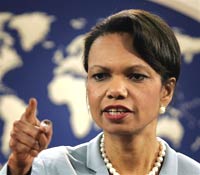Rice says Israel ready to discuss 'fundamental issues' with Palestinians
U.S. Secretary of State Condoleezza Rice says Israel is ready to discuss "fundamental issues" with Palestinians who are now governed by leaders accepted by the Jewish state and the West.

Still, she left the agenda for any peace talks vague.
The top U.S. diplomat, making her first visit to Israel and the occupied West Bank since Palestinian leadership was cleaved into rival governments, also promised that a proposed U.S.-sponsored Mideast conference this fall would be a serious push toward a peace agreement.
"The president of the United States has no desire to call people together for a photo op," Rice told reporters Thursday during a morning of meetings meant to demonstrate confidence in the moderate-led Palestinian government in the West Bank. Hamas militants control the smaller Gaza Strip territory.
The visit included its own photo opportunity, a made-for-the-cameras signing ceremony for a U.S. plan to spend about US$80 million (EUR 58.5 million) to improve security services loyal to the West Bank government. The money was pledged previously and is a small donation when compared with European spending on the impoverished Palestinians.
The Bush administration sees the Palestinians' bitter internal split as a potential opportunity to push for a political settlement between Israel and the Palestinians, using the West Bank as a model.
Hamas, an Islamic movement pledged to the destruction of Israel, won elections in January 2006. The U.S and Israel list Hamas as a terrorist group and refuse to deal with it.
Rice met earlier with the entire Palestinian Cabinet, a gesture of support for the team of moderates that replaced the Hamas government after the Islamic militants seized Gaza by force in June.
Rice made Prime Minister Salam Fayyad's office her first stop in the West Bank, a measure of the U.S. hopes that the international banker can buttress the perpetually disorganized Palestinian government.
Hamas considers the West Bank-based government to be illegitimate. A Hamas spokesman, Sami Abu Zuhri, accused Rice of trying to deepen divisions among Palestinians, saying she "is not coming to establish a Palestinian state but to build death squads that will work against resistance groups, including Hamas."
The United States hopes that Palestinian President Mahmoud Abbas, with the help of a technocrat government acceptable to the West, will finally claim the strong leadership mantle that has eluded him as the successor to the charismatic Yasser Arafat. With Washington's backing, Israel has released frozen tax funds to bolster Abbas, along with more than 200 Palestinian prisoners jailed by Israel.
Abbas, Rice's host at Arafat's old headquarters, said he is ready to work with Israel on a "declaration of principles" as a step toward a full peace agreement.
Israeli Prime Minister Ehud Olmert had floated the idea last week. Such a declaration, as envisioned by Israel, would outline the contours of a future independent Palestinian state, without immediately tackling the most explosive issues in the nearly 60-year-old conflict.
Rice presumably was referring to Olmert's idea when she noted approvingly that Israel is ready to talk about fundamental questions. But in a region where words carry loaded meanings, Rice ducked when asked to define the term.
"I believe the word fundamental speaks for itself," she said during a press conference with Abbas.
Later, Rice told reporters traveling with her that Abbas and Olmert are not avoiding the hardest questions.
"I've said from the beginning I thought this was a dialogue that had to take place between the two men and they had to be able to do it with some discretion so they can talk about all the issues that are on the table for them."
Abbas who is to meet with Olmert on Monday, said their ongoing discussions "could end in a declaration of principles."
Once such a declaration has been negotiated, "what is important is that we arrive at a result and that we know what that result is, what is the roof that we need to reach and what are the stages of implementation that we can agree on," Abbas said.
He was referring to the final and hardest issues - the borders of a state, the fate of disputed Jerusalem and the rights of Palestinians or their descendants who fled or were evicted from land in what is now Israel.
Rice said regional leaders, including those in Saudi Arabia, told her during her current Mideast swing that the conference must deal with issues of substance.
"Prime Minister Olmert told me last night that he, too, shared that view, that this was a meeting that ought to be and needs to be substantive and meaningful and that will, in fact, help get to a two-state solution," Rice said.
Olmert's office said in a statement Thursday that the Israeli leader "shares the same approach, that the international meeting will be serious and meaningful, and that he welcomes the participation of leaders of Arab countries in the meeting."
Subscribe to Pravda.Ru Telegram channel, Facebook, RSS!


